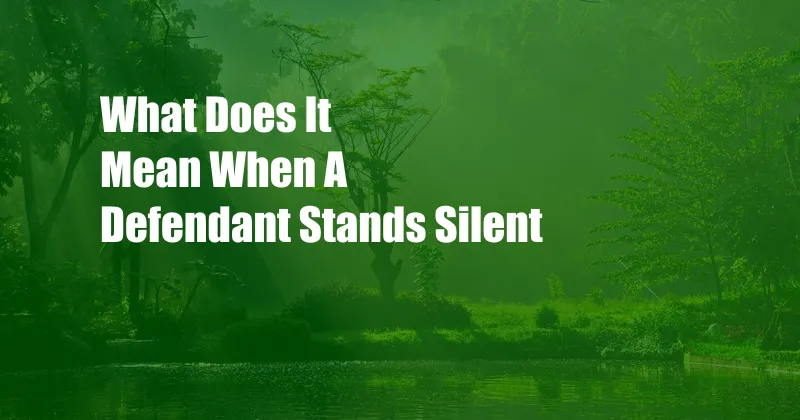
Standing Silent: The Significance of a Defendant’s Silence
In the realm of criminal justice, silence can hold immense weight. The decision of a defendant to remain silent when faced with accusations can elicit a myriad of assumptions and speculations. Does it imply guilt? Is it a defense strategy? Understanding the implications of a defendant’s silence requires a comprehensive examination of its legal and social contexts.
A defendant’s right to silence is a fundamental principle enshrined in many legal systems. The Fifth Amendment of the United States Constitution, for instance, protects individuals from being compelled to self-incriminate. This right stems from the notion that a person should not be forced to provide evidence against themselves, thus preventing coerced confessions or other forms of undue pressure.
Silence as a Defense Mechanism
Strategic Silence
Strategic silence is a defense strategy employed by defendants to protect their legal interests. By declining to testify, they can avoid potentially damaging cross-examination and limit the prosecution’s access to their thoughts and motives. This approach may be particularly beneficial when the evidence against them is weak or circumstantial.
Denial of Guilt
Defendants may also choose to remain silent as a means of denying guilt. By withholding their account of the events, they signal a refusal to acknowledge or accept responsibility for the charges against them. This strategy can be effective in challenging the prosecution’s case and creating doubt in the minds of jurors.
Preservation of Rights
Additionally, silence can serve as a means of preserving the defendant’s rights for later appeals or post-conviction proceedings. By not testifying, they have not made any statements that could be used against them in a subsequent trial or hearing.
Interpreting Silence
Guilt or Innocence?
While silence may be a legitimate defense strategy, it often carries the stigma of guilt in the eyes of the public and jury. The absence of a voice can be construed as a sign of hiding something or being unable to refute the accusations. However, it is crucial to recognize that silence alone is not an admission of guilt and should not lead to automatic assumptions.
Consider Context
The meaning of silence varies depending on the specific circumstances of the case. Factors such as the defendant’s demeanor, prior statements, and relationship with the alleged victim must be considered. Interpreting silence as an indication of guilt or innocence requires a thorough examination of all available evidence.
Expert Advice for Defendants
Tips
- Consult with an experienced attorney to understand your rights and the potential implications of silence.
- Consider the strength of the evidence against you and whether silence is a viable strategy.
- Be aware of the potential stigma associated with silence and ensure you have a compelling justification for your decision.
Explanation
Seeking legal advice is paramount, as an attorney can provide personalized guidance tailored to your specific situation. Assessing the evidence against you is crucial to determine if silence is an effective defense strategy. Finally, anticipating and being prepared to address any negative perceptions associated with silence can mitigate its potential impact on your case.
FAQs on Silence and the Law
- Do defendants have an obligation to testify? No, the Fifth Amendment protects individuals from being compelled to testify against themselves.
- Can silence be used as evidence of guilt? While silence alone is not an admission of guilt, it can be considered along with other evidence during a trial.
- What are the exceptions to the right to silence? Courts may compel defendants to testify in specific limited circumstances, such as when there is a risk of false testimony.
Conclusion
A defendant’s silence is a complex and nuanced concept with significant legal and social implications. While it can be a legitimate defense strategy, it carries both potential benefits and risks. Understanding the meaning of silence, its strategic use, and its interpretation is essential for both defendants and those seeking a fair and just criminal justice system.
Are you interested in further exploring the intricacies of a defendant’s silence in the criminal justice process? Join our online discussion forum or subscribe to our legal blog for in-depth analysis, expert insights, and updates on the latest developments in this fascinating area of law.